#ramadan calendar
Text
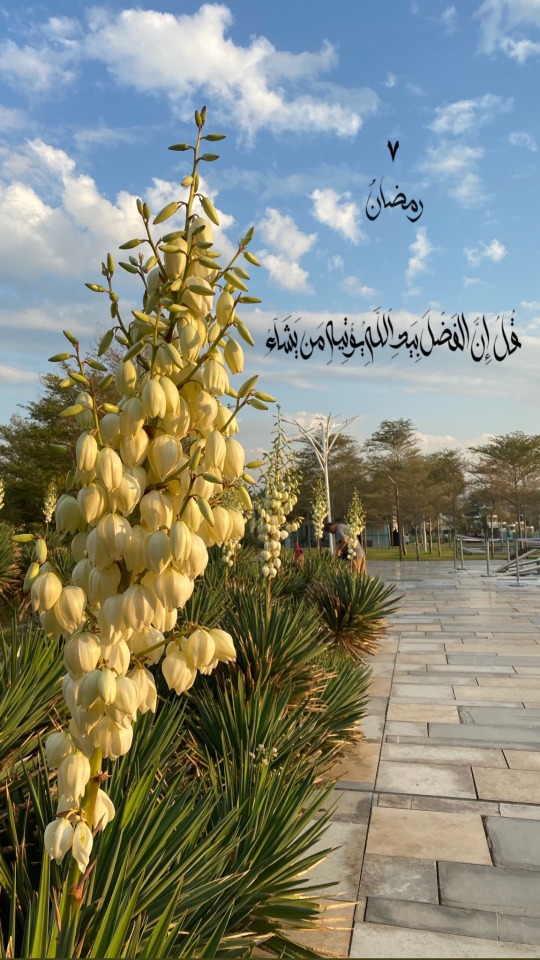
٧ رمضان ١٤٤٥هـ
إياكَ أن تحزن على فوات الأشياء!
هناك فرص كان لابد وأن تضيع، لأنها لو لم تَضِع لَضِعتَ أنت✨
#تصويري#ramadan#رمضان#مفكرة رمضان#flowers#ورد#الكويت#٧ رمضان#رمضانيات#رمضان 2024#رمضان ١٤٤٥#رمضان٢٠٢٤#٧رمضان#7 ramadan#ramadan calendar#ramadan 2024#ramadan 1445#7ramadan1445h
14 notes
·
View notes
Text
1 note
·
View note
Text

Printable Ramadan Planner 2023, Undated Ramadan Tracker & Journal, Ramadan Gift, Islamic Planner, Ramadan Mubarak, PDF INSTANT DOWNLOAD 2023
#ramadan#islamicquotes#ramadan planner#alhamdulillah#islamic#ramadan planner 2023#ramadan planner and journal#2023 muslim planner & ramadan journal#Ramadan Mubarak Planner and Journal#ramadan calendar#ramadan books for kids#ramadan kareem#Ramadan Tracker & Journal#Islamic Planner#ramadan journal#ramadan eid 2023#ramadan holiday#ramadan meaning#ramadan start#ramadan jewish#ramadan rules#ramadan lantern#ramadan origin#ramadan 1999#ramadan 3023#ramadan gifts#ramadan in 2023#ramadan next year#ramadan this year#ramadan youtube
3 notes
·
View notes
Text
We blend the joy of an Iftar Party with the excitement of a surprise Birthday celebration for social media influencer @anzil.sulthan ! 🎉🎂 Neznco Digital Marketing Academy Institution is thrilled to host this unforgettable event in Malappuram. Get ready for heartwarming moments, delicious food, and plenty of surprises! Don’t miss out on the fun! #iftarparty#birthdaycelebration#NezncoDigital#malappuram
#Iftar#Ramadan#2024#fasting#suhoor#Islam#spirituality#community#family#tradition#blessings#Quran#prayer#reflection#charity#generosity#unity#fasting hours#Ramadan calendar#Ramadan activities#Eid#Islamic traditions#Ramadan recipes#Muslim culture.
0 notes
Text
Exploring the Indian Ramadan Calendar and its Regional Traditions
The Indian Ramadan Calendar
The Indian Ramadan Kareem calendar is based on the sighting of the moon, which marks the beginning of the holy month. The Islamic calendar is lunar, consisting of 12 months that are based on the cycles of the moon. As a result, the dates of Ramadan shift approximately 10 or 11 days earlier each year about the Gregorian calendar.

Sighting of the Moon in India
In India, the sighting of the moon is a significant event that determines the start and end of Ramadan. It is traditionally done by religious scholars and experts who carefully observe the sky to spot the new moon crescent. Once the moon is sighted, the news is announced, and the entire Muslim community begins their fasting and observance of Ramadan.
Regional Variations in India
However, due to the vast geographical expanse of India and its diverse population, the sighting of the moon can vary from one region to another. This leads to slight variations in the start and end dates of Ramadan across different states of India. For example, in some states, the moon may be sighted a day earlier or later than in others, resulting in a difference in the beginning and end of Ramadan.
Observance of Ramadan in India
Despite these regional variations, the observance of Ramadan in India is a unifying experience for Muslims across the country. It is a time of reflection, prayer, and self-discipline. Muslims wake up before dawn to have a pre-fast meal called Suhoor and then abstain from food and drink until sunset. The fast is broken with a meal called Iftar, which typically includes dates, water, and a variety of delicious dishes.
During Ramadan, mosques are filled with worshippers attending Taraweeh prayers, which are special congregational prayers held every night. The recitation of the Quran during these prayers is completed over the month. It is also a time when Muslims engage in acts of charity, giving to the less fortunate and helping those in need.
Significance of the Indian Ramadan Calendar
The Indian Ramadan calendar not only marks the start and end of the holy month but also serves as a reminder of the importance of unity and community. It is a time when families come together to break their fast, share meals, and strengthen their bonds. It is a month of self-reflection, spiritual growth, and deepening one's connection with God.
The Lunar Calendar and Ramadan
The lunar calendar has played a significant role in the observance of Ramadan throughout history. The Islamic calendar, also known as the Hijri calendar, is based on the lunar cycle, which consists of approximately 354 or 355 days. This is in contrast to the Gregorian calendar, which is a solar calendar and consists of 365 or 366 days.
Due to the difference in the length of the lunar and solar years, the dates of Islamic months, including Ramadan, vary each year with the Gregorian calendar. This means that Ramadan does not fall on the same dates every year, but rather shifts approximately 10 or 11 days earlier each year. This constant movement of Ramadan throughout the seasons allows Muslims to experience the blessed month in different parts of the year, providing a diverse range of spiritual experiences.
Determining the Beginning and End of Ramadan
The beginning of Ramadan is determined by the sighting of the new moon, which marks the start of the Islamic month of Shawwal. This sighting is usually done by religious authorities or local committees who observe the sky. The process involves looking for the crescent moon shortly after sunset, and if it is sighted, it signifies the start of Ramadan. However, if the moon is not visible due to weather conditions or other factors, the beginning of Ramadan is determined by completing a full 30 days of the previous month, Sha'ban.
Once the new moon is sighted, the first day of Ramadan begins, and Muslims around the world embark on a month-long journey of fasting, prayer, and reflection. The duration of Ramadan is either 29 or 30 days, depending on the sighting of the moon. This variation in the length of Ramadan adds to the anticipation and excitement of the month, as Muslims eagerly await the announcement of Eid al-Fitr, the festival marking the end of Ramadan.
The end of Ramadan is marked by the sighting of the new moon of the following month, Shawwal. This sighting is also done by religious authorities or local committees, and once the moon is sighted, it signifies the end of Ramadan and the beginning of Eid al-Fitr. This festive occasion is celebrated by Muslims worldwide, as they come together to offer prayers, exchange gifts, and engage in acts of charity. It is a time of joy and gratitude, as Muslims commemorate the completion of Ramadan and the blessings they have received throughout the month.
0 notes
Text
Ramadan Prayer Time Table 2024 & Understanding Ramadan: A Comprehensive Guide

An Insightful Journey Through Ramadan
Ramadan, the ninth month of the Islamic lunar calendar, marks a period of profound spiritual reflection, fasting, and community for Muslims worldwide. This guide delves into the essence, practices, and global observance of this sacred month, providing a deep understanding for both Muslims and curious non-Muslims alike.
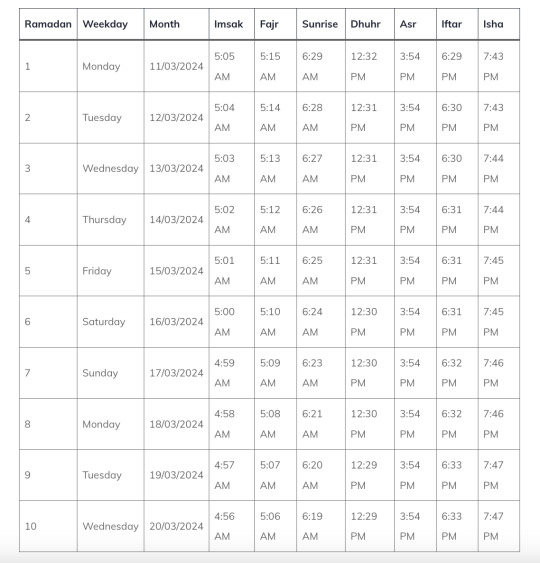
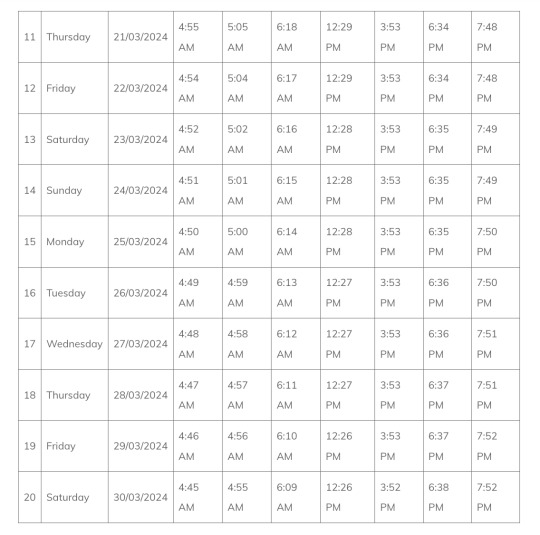
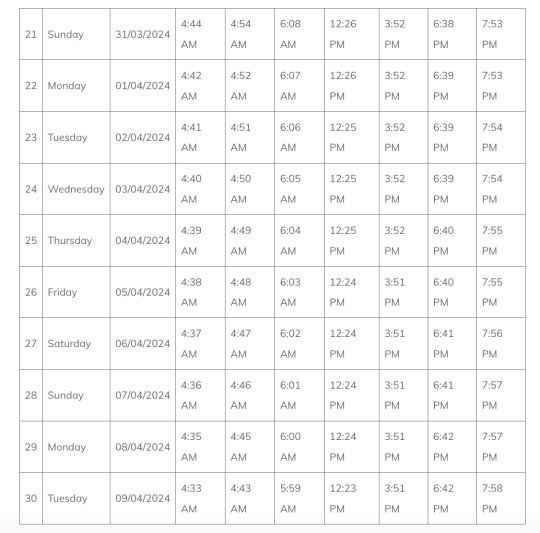
Introduction to Ramadan
Ramadan is not just a time of abstention from food and drink from sunrise to sunset; it’s a period rich in spiritual reflection, prayer, and community. The Islamic lunar calendar, based on the moon’s phases, sets the stage for this holy month, which commemorates the revelation of the Holy Quran to Prophet Muhammad (PBUH) by the archangel Gabriel.
The Spiritual Essence of Ramadan
During Ramadan, the focus is on purifying the soul, practicing self-discipline, and dedicating oneself to prayer and reading the Quran. The last 10 days hold special significance, with the “Night of Power” or Laylat Al Qadr, considered the holiest night, when prayers are believed to be most potent.
Practices and Observances
Muslims across the globe engage in fasting, abstaining from food, drink, and other physical needs during daylight hours. This act of faith and worship is intended to cleanse the soul and foster empathy for the less fortunate. Nights are spent in prayer, and the importance of charity is emphasized, aligning with the spirit of giving and gratitude.
Cultural Impact and Working Hours
The observance of Ramadan brings about changes in daily routines and work schedules, especially in Muslim-majority countries. For instance, in the UAE, working hours are reduced, allowing more time for spiritual activities and family gatherings.
The Five Pillars of Islam and Ramadan’s Role
Fasting during Ramadan is one of the Five Pillars of Islam, essential practices that form the foundation of a Muslim’s faith and lifestyle. This section explores how Ramadan integrates into these pillars, emphasizing its significance.
Iftar and Suhoor: Traditional Meals
The pre-dawn meal (Suhoor) and the meal to break the fast (Iftar) are central to Ramadan’s daily routine. These meals are not only a time for physical nourishment but also for communal gatherings and shared gratitude.
Understanding the Islamic and Gregorian Calendars
Ramadan’s timing shifts annually due to the differences between the lunar and Gregorian calendars. This section explains the calendars’ workings and why Ramadan moves ahead by approximately 10–11 days each year.
Eid Al Fitr: The Celebration After Ramadan
The conclusion of Ramadan is marked by Eid Al Fitr, a festive time of joy, communal prayers, and generosity, where the focus shifts from fasting to feasting and giving.
Ramadan Across the Seasons
Depending on the geographical location and the time of year, the experience of fasting can vary greatly. This part explores the observance of Ramadan in different seasons and climates.
Ramadan’s Significance for Different Demographics
Special considerations are given to children, new converts, and individuals with medical conditions, highlighting the inclusivity and adaptability of Ramadan observances.
Community and Global Participation
The spirit of Ramadan extends beyond the Muslim community, inviting non-Muslims to participate in various aspects of the month, from iftar dinners to charitable acts, fostering a sense of global unity and understanding.
FAQs About Ramadan
This section addresses common questions and misconceptions about Ramadan, offering clear, informative answers to enhance understanding and respect for this holy month.
Conclusion
Ramadan is a time of spiritual renewal and community for Muslims around the world. Its observances, from fasting to feasting, reflect a deep commitment to faith, empathy, and global solidarity. Whether Muslim or non-Muslim, understanding Ramadan enriches our global tapestry of cultures and beliefs, promoting a shared respect for sacred traditions and practices.
M.Hussnain
Private Wolf | facebook | Instagram | Twitter | Linkedin
0 notes
Text
ok so im not sure that this is articulate for ppl who aren't calendarheads like me but the jewish and islamic calendars are both calendars in which a year is 12 lunar cycles, and the difference is that the jewish calendar has leap months whereas the islamic calendar does not. so every 2/3 years, the jewish calendar actually has 13 months, and so each time there's a leap month, the jewish and islamic months become out-of-sync by one month. the jewish leap months are timed so that the calendar is in accordance with the metonic cycle (the way that the lunar and solar cycles always align in the same way they did 19 years previously). which is to say, since the jewish calendar was standardized, there have been cycles of 19 years wherein there is a leap month during the 3rd, 6th, 8th, 11th, 14th, 17th, and 19th years (sidenote—you can find what year we are in the cycle by dividing the jewish year by 19 and taking the remainder. for example, this year is 5783, and 5783/19=304r7, so it's the 7th year in the cycle, and not a leap year). but last year was the 6th year in the cycle—it was a leap year. so, it shifted the jewish calendar wrt the islamic calendar, and it put the month nissan (the month in which passover is celebrated) in alignment with the month of ramadan. this year, ramadan and nissan will stay in alignment. and next year, the 8th year in the cycle, ramadan will be in alignment with the leap month itself, which is inserted before nissan. so, it'll take 12 more jewish leap years before nissan and ramadan co-occur (if you look closely, you'll notice that it takes 33 years for 12 jewish leap years to occur, and you might recognize 33 as the number of years it takes for the islamic calendar to fully cycle around the gregorian calendar. which, of course, is not a coincidence!). as you can see, most of the gaps between leap years are 3 years long, but at the current part of the cycle, it's 2 years long. ANYWAY all this is to say that if it were a 3-year gap rn we'd be able to reuse that he is risen/he is not/he is off-limits until sunset meme for 3 years instead of just 2. sad.
#also I've decided that calendarhead is the best term for someone who is nerdy about calendars#english is usually really good at having words for things like that but it doesn't here#txt#also yesterday i asked some catholic acquaintances whether ash wednesday was always on the new moon and they didn't know. sad#but then i realized that i was able to figure out the answer myself lol#hmm my dad made a mathematical formula for whether it's a leap year but i forget what it was.... i should ask him#this is also all a little bit more complicated by whether ramadan falls before/during or after adar on the jewish calendar but we dont need#to get into that. well we dont need to get into any of this but it Is fun so#jew tag#<- tagging it mainly so i can find this post again if i want lol#calendars
80 notes
·
View notes
Text
I'm not at all religious but I fucking love it when people include their pets in their ceremonies. I just saw a cat dressed up (and looking 🔥🔥) in little Iftar outfits. Remember that tweet about the Jewish household who got their cat an advent calendar because, well, who are they to tell the cat she has to be Jewish? I've seen videos of people taking a huge variety of animals to be blessed by the pope, all looking incredibly befuddled. And the cats who love their owners' prayer mats? So they have to have their own? Incredible
3 notes
·
View notes
Text

//I think part of why I am having difficulty with threads lately is that I am now at a number where I am completely overwhelmed, even with RPthreadtracker (which is a GODSEND, btw).
That isn’t to say you shouldn’t have a starter with me (especially if we haven’t RPed yet!). In fact, feel free to throw them my way, I’ll very likely love it! The problem is that I am very ADHD and I’m on a bajillion medications lmao, sometimes I legitimately need to step back and take life one step of a time.
So forgive me if you sent me a starter and I haven’t answered it yet. Or if tracked your thread and I haven’t answered in a long time. I’ll get to it eventually. Just give me time. I don’t want to burn myself out, I’m still kicking my ass for vanishing for almost an entire year for that burnout in particular.
#I am particularly sad I dropped the storylines I had going for spring of last year#it was GOLDEN#pesach ramadan easter and qingming were happening at the same time DO YOU HAVE ANY IDEA HOW RARE THAT HAPPENS#idk if that's going to happen again this year considering the Jewish and Muslim calendars are not the same as the Gregorian calendar#but LMAO coincided with stress at work life WoW RP and everything#just#gotta take it easy#and you all too#don't overwhelm yourselves#RP is supposed to be fun#take it easy#[OOC]
7 notes
·
View notes
Text
People who have advent calendars: when do you open them? In the morning with breakfast? After dinner? When you get back from school/work as a reward for getting through it- but then what about the days when you’re not there? And also, why do you open it when you open it? Is it a childhood thing or something you started yourself?
#sumayyah stop#there’s no reason for this#well there’s no writing reason#im asking because i have a ramadan calendar#so i open it at iftar because it’s the only logical time#but advent calendars are different
4 notes
·
View notes
Text
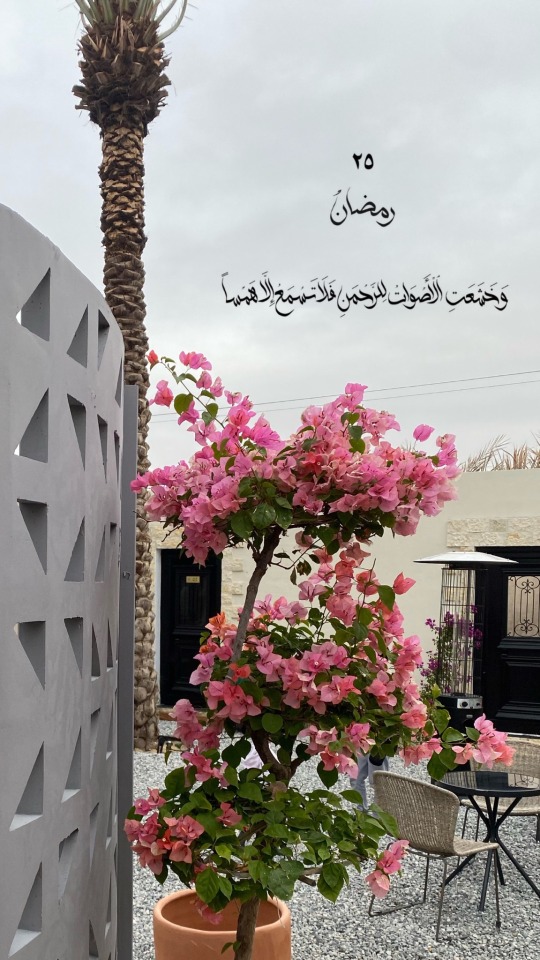
٢٥ رمضان ١٤٤٥هـ
اللهم أغدق علينا من فضلك وأنزل علينا من بركاتك وأكرمنا بقبول الدعاء وصلاح العمل، واجعلنا ممن حسنت سيرتهم واستمر أجرهم في حياتهم وبعد مماتهم.
#تصويري#ramadan#رمضان#مفكرة رمضان#الكويت#ورد#رزنامة رمضان#flowers#رزنامة#كلمات#دعاء#٢٥ رمضان#٢٥رمضان#٢٥ رمضان ١٤٤٥هـ#رمضان 2024#رمضان ١٤٤٥#رمضان ٢٠٢٤#ramadan calendar#25ramadan#25 ramadan#25 Ramadan 1445h#ramadan 2024#ramadan 1445
11 notes
·
View notes
Text
Eid al-Fitar and Dogs Datça Turkey
Dusk Serap Café – trip.com
Wednesday, April 10th, is Eid Al-Fitr in Turkey. Eid “corresponds to the first day of Shawwal, the tenth month in the Islamic calendar“. The date marks the end of Ramadan and is locally known as “Seker Bayram” or the “holiday of sweets”. Turkish people celebrate by exchanging family visits and gifts. It’s a happy time, when Muslims “celebrate the end of fasting, and…
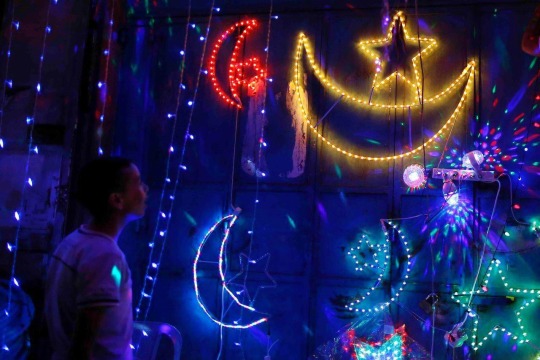
View On WordPress
#Datça Dogs#Eid#Eid al-Fitr in Turkey#Holiday of Sweets#Islamic Calendar#Ramadan#Serap Café Datça#Şeker Bayram
0 notes
Text
The following is a calendar of events happening this weekend near Santa Clara and Sunnyvale. Want to share an event to be featured? Please email the details to [email protected] for consideration. Smithsonian Institution Traveling Exhibition: The Bias Inside Us — April 1 – April 21 at Santa Clara University Library (500 El Camino Real, Santa Clara). Read complete article at svvoice.com.
Santa Clara University Library#
0 notes
Text
Ramadan Mubarak to any Muslim followers!!
1 note
·
View note
Text
Ramadan 2024 Fasting Hours: Longest & Shortest Worldwide
Ramadan, the holiest month in Islam, is a time of spiritual reflection and devotion observed by Muslims worldwide. During this sacred period, Muslims abstain from food and drink from sunrise to sunset. However, the length of these fasting hours varies greatly across the globe due to the Earth’s tilt and the sun’s position.
Understanding the Variations in Fasting Hours:
As the Earth orbits the…

View On WordPress
#digitalislamic#Fast#Fasting#How many hours fasting for Ramadan 2024?#Longest and shortest fast duration all around the world ramadan 2024 calendar#Longest and shortest fast duration all around the world ramadan 2024 islam#longest fasting hours in the world 2024#longest fasting time in ramadan#longest fasting time in the world#Ramadan#Ramadan Fasting Hours in 2024#saudi arabia#shortest fasting time for weight loss#shortest ramadan fasting time in the world 2024#What are Ramadan dates for 2024?#What religion is fasting right now 2024?#Which country has the longest fast in Ramadan 2023?#which country has the shortest fasting hours
0 notes